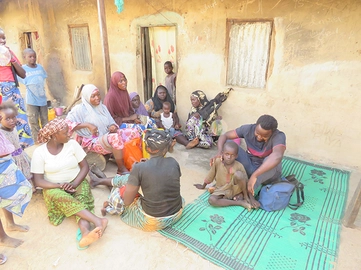“There is a need to strengthen and democratize local institutions.”
September 17, 2020.
Oyewole Simon Oginni is a doctoral student from Nigeria at ZEF working on his thesis “Humanitarian urbanism: everyday life in the front-line cities of the Lake Chad Basin”. Andreas Haller interviewed him for ZEFnews.
You were conducting your field research in the cities of Maroua, Cameroon and Mubi, Nigeria in the Lake Chad region when the pandemic struck. In two blog-posts for our website you described the situation there (see links below). How are you doing right now?
Thank you, I am doing well. I wrote about how the Covid-19 outbreak affects the urban poor there because I was just a few weeks from completing my fieldwork when the pandemic struck. I also experienced the lockdown. So, I was both an insider and an outsider. Cities in the Lake Chad Basin region serve as commercial hubs for the exchange of agricultural produce of four countries. They also hold a large displaced population. The cities of Mubi and Maroua, like their counterparts in Chad and Niger, are facing multiple challenges that range from infrastructural deficits to insecurity caused by violent extremism and climate change. Covid-19 added another layer to the existing challenges. Nonetheless, there is much to learn from how the urban poor build resilience despite their precarious living conditions. Some examples will feature in my doctoral thesis.
Has the perspective of your research shifted as the pandemic compounded the tensions in the cities you study?
Yes, a lot has changed in my research. My main focus was on the modalities of return and reception of displaced populations in post-conflict cities and their interactions with the host communities. The goal was to understand how people rebuild their lives after protracted conflicts by analyzing their everyday experiences. Now, I have to think about the population affected by Covid-19 in addition to the conflict-affected population. Many people have lost their livelihoods, and there is a new stratum of urban poor due to the ‘new normal’ created by the pandemic. My initial conceptualization of the urban poor has changed drastically. I have to reflect again on who falls into the category of urban poor because there are now ‘the poorest of the urban poor’. I achieved my research objective to a great extent, but the pandemic presents an avenue to explore how the poorest of the urban poor navigate in a post-conflict and post-Covid-19 context. In the future I would like to go back to re-assess the situation in these cities. There is much fear of a global recession due to the pandemic.
What is the outlook for the urban poor, especially for the displaced people in post-conflict cities, when the economic downturn hits the region? Also, could this lead to a new increase in political and sectarian violence in the region?
The countries in the Lake Chad Basin region are already facing a recession. Nigeria, which has played the role of big brother in the region, is currently experiencing a major economic setback due to the global price drop of crude oil. This has many implications for the region in terms of counterinsurgency and the provision of public goods to the vulnerable population. The bordering cities already have the highest inflation, unemployment as well as poverty rates compared to the rest of the region. The inability of the respective governments to provide enough assistance to cushion the effects of the pandemic may increase political and sectarian violence. This may make the recruitment of young people for Boko Haram and the Islamic State in West Africa much easier. Terrorists take advantage of the weakness of governments and their failure to provide services. The violent extremists in the region have already capitalized on this over the past decade.
What could be done by local governments, but also by the international community, to relieve the situation in the Lake Chad region?
The Lake Chad Basin Stabilization Strategy (2018-2023) is the result of a multilateral cooperation that seeks to reposition the region. It addresses most challenges of the region based on a sectoral analysis. However, its implementation has been slow. There have been meetings at the regional level involving the regional governors, but the participation of local governments has been minimal. There is a need to strengthen and democratize local institutions in the region so that the Stabilization Strategy can be localized. For example, this may empower mayors to make autonomous decisions on critical infrastructure projects. The Lake Chad Basin is mostly comprised of farming communities, but agriculture is predominantly carried out in a primitive form. At least partial mechanization would help to mitigate the effects of climate change on crops, address food insecurity in the cities, and has the potential to create new jobs.
You are a member of the “ZEF in the City” working group. What are the more general challenges for development research regarding urban space?
Rapid urbanization as a consequence of displacement through protracted conflicts has caused a shift in the past decade in the way people conceptualize urban space and how it interacts with other spaces. New actors such as the humanitarian establishment and development actors, influence the socioeconomic and political configuration of urban space.
What is the most important take-away from your time at ZEF?
ZEF builds a community of thinkers and helped me develop an ability to look at issues from an interdisciplinary perspective. For example, I now see human security from different angles than when I first came here: I think of how environments contribute to the emotional land-scape and affect well-being and productivity.
Read more about the outbreak of the pandemic in the Lake Chad region in Oyewole Simon Oginni's contributuion to ZEF’s research blog:
Coping with COVID-19 in post-conflict communities
Part 1: Covid-19’s impact on West Africa’s vulnerable communities
https://www.zef.de/2129/blog-west-africa-part-1.html
Part 2: What does a lockdown entail in the Lake Chad Basin region?
https://www.zef.de/2129/blog-west-africa-part-2.html


